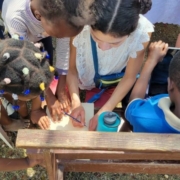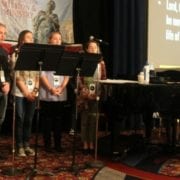Tamir Rice: ¡Presente!
BY CHRIS KERR | December 30, 2015
Earlier this week our country learned the results of a grand jury hearing in Cleveland. The local county prosecutor announced that the police officers responsible for the killing of Tamir Rice, a 12-year old outside a recreational center with a toy gun, will not face trial for his death. Following the announcement protests began in Cleveland and editorials were published across the country expressing dismay. I think I joined many Americans in asking the question, “How can this happen?”
As I continued to reflect on the results of the grand jury, I could not help but think about two speeches offered at this year’s Ignatian Family Teach-In for Justice. The Teach-In’s main stage has always been a space for prophetic voices to offer challenging reflections on key justice issues. This year did not disappoint, especially when it came to engaging a major topic facing our nation, including Jesuit universities, high schools, and parishes across the country.
No Longer Michael Brown’s Body, It Was My Own
Brendan Underwood, an African American student at Saint Louis University High School reflected on feelings the evening that Michael Brown was killed saying:
“I couldn’t turn away because Michael Brown was killed 3-minutes away from my house. At that moment it was no longer Mike Brown’s body in the street, it was my own.”
Brendan went on to describe the steps that would lead him to develop the Student Teacher Association for Racial Study (S.T.A.R.S.), a school group aimed at facilitating better communication between students and teachers while educating the campus community on the topic of racism.
In his closing comments Underwood said, “Each of us is called to awaken to the way that we can fight injustice.” Brendan’s response to racial injustice was STARS? What could yours be? What could our Ignatian family’s response be?
What if Martyrs of Racism Were Remembered Just Like the Salvadoran Martyrs?
Maureen O’Connell, Ph.D., built on the energy of Brendan’s powerful testimony by presenting the crowd of students, faculty, parish members, alumni, current and former Jesuit Volunteers, etc., with challenging questions about the presence of racism in our own communities. O’Connell is the chair of the theology department at LaSalle University in Philadelphia, a graduate of Saint Joseph’s University and Boston College, and has written extensively about the dynamics of racial justice in Catholic higher education.
During her address she invited the crowd to consider how Jesuit campus and parish communities might become in solidarity with victims of racial justice in the same way that they have come to embrace solidarity with the people of Central America in response to the deaths of the Jesuits and lay women killed in El Salvador in 1989.
O’Connell said the following:
“What if Saint Louis University became Michael Brown and the community of Ferguson?
What if Regis Prep became Eric Garner and the people of color of Staten Island, and Fordham University Akai Gurley and the people of Brooklyn?
What if the University of Detroit Mercy would shout “Presente!” for Renisha McBride and women of color of Detroit?
Or if John Carroll University were to jump to their feet for Tamir Rice and communities of Cleveland?
Loyola Maryland would claim Freddie Gray and Baltimore.
Strake Jesuit in Houston would stand for Sandra Bland and the folks of Waller Texas.”
Each year during the Teach-In, the Jesuit martyrs of El Salvador as well as around the world are commemorated during a moving evening prayer service. The names of each Jesuit martyred during modern time, a list that now numbers at nearly 60 men of varying ages and nationalities, is read while a candle is lit in their honor. After the reading of each name the crowd responds – “¡Presente!” Translated from Spanish this phrase signifies that the person’s spirit lives on in us. In an effort to further emphasize her point, O’Connell posed the question, “What if we were to remember the names the martyrs of racism in the U.S. in the same way we remember the martyrs of November 16th?”
Tamir Rice: Where Do We Go From Here?
 As the Jesuit network and Ignatian family continue to reflect on the realities of racial injustice that plague our nation and even our own campus and parish communities, what can be learned from Brendan and Maureen? How can our Ignatian tradition help us to discern next steps? What ways would you like to see ISN further these conversations moving forward?
As the Jesuit network and Ignatian family continue to reflect on the realities of racial injustice that plague our nation and even our own campus and parish communities, what can be learned from Brendan and Maureen? How can our Ignatian tradition help us to discern next steps? What ways would you like to see ISN further these conversations moving forward?
There is much to consider, lots to pray about, and a need for action to be sure.
For now, all I can say is — Tamir Rice, ¡Presente!
Chris joined the Ignatian Solidarity Network (ISN) as executive director in 2011. He has over fifteen years of experience in social justice advocacy and leadership in Catholic education and ministry. Prior to ISN he served in multiple roles at John Carroll University, including coordinating international immersion experience and social justice education programming as an inaugural co-director of John Carroll’s Arrupe Scholars Program for Social Action. Prior to his time at John Carroll he served as a teacher and administrator at the elementary and secondary levels in Catholic Diocese of Cleveland. Chris speaks regularly at campuses and parishes about social justice education and advocacy, Jesuit mission, and a broad range of social justice issues. He currently serves on the board of directors for Christians for Peace in El Salvador (CRISPAZ). Chris earned a B.A. and M.A. from John Carroll University in University Heights, Ohio. He and his family reside in Shaker Heights, Ohio.











Those of us who come from Catholic pro-justice and law enforcement families are saddened by this discussion. While racism and brutality exists in every profession, the way these cases are being portrayed scape goats and endangers officers as a whole. I fail to see the connection between the martyrs and these cases, and I follow this page consistently. I support a discussion on racial justice but this goes too far. Those of us from a law enforcement background don’t feel included or respected in the discussion. The recently published study by the Washington post lend credibility to the statistics consistently published by law enforcement rather than black lives matter and other entities concerned about the activities of law enforcement. Multiple officers have been charged and brought to court and found not guilty by a jury of their peers. The justice system exists for a reason. I respect their decisions and feel justice was served, but either way, law enforcement fails to regain its credibility.
Julie – Thanks for your comment. Law enforcement professionals definitely need to be part of the dialogue on how we can continue to build communities where people of all racial backgrounds are respected and valued. Your perspective is welcome to be sure.
However, we also want to make sure that the perspective of young black men, who have watched their peers lose their lives, is welcome and valued as well. Brendan Underwood spoke at the Teach-In as a young black male who watched on television as someone much like him died in the middle of a street in Ferguson. While our country has overcome tremendous hurdles in regards to racial justice, the loss of so many young black men and children through acts of violence, including unarmed individuals killed by law enforcement, requires us to question what is happening in our country today. Are we demonstrating as a nation that “all lives matter” as some have rebutted to those who say that “black lives matter”? If this statement of “all lives” is true then we still have work to do as a nation.
For these conversations to be effective, law enforcement professionals will need to be a key part of the conversation — but not the only voice.
The justice system does exist for a reason, as an element of enforcing laws established through our democratic system. However, like anything established and managed by human beings, it is not perfect. It only comes that much closer to perfection when we are willing to take a step back and ask challenging questions with an openness to reflect on and question the realities around us, even our own actions and beliefs.
Thanks for having the courage to share your views and thanks to members of your family who have committed to serving our communities as law enforcement professionals.
Thank you for your reply. Given that law enforcement wasn’t invited to conferences or to share their views on blogs such as this one and others, I fail to see how we are the only voice. We don’t even have a voice in this discussion, and because police contracts restrict officers from various forms of public commentary, there is little we can do to address this narrative about policing. Whether the officers in these cases are found innocent or guilty, and even though these cases address fewer than 1% of the more than 670,000 officers in this country, it seems we are going to lose and fail to regain our credibility and the public trust we deserve. Concerns about policing can be addressed without making generalizations about and demoralizing officers as a whole. Given the tone of this article and others, I and my family don’t feel the support for their selfless service that you mentioned above. We feel misunderstood and unappreciated with little recourse against the tide of the dominant narrative. I don’t find my sharing courageous, but my responsibility to speak for the vast majority of officers who serve their communities well but are prevented from speaking their minds. I’m a proud graduate of Jesuit education, but if the work of such associates is going to be so one-sided and polarizing in the name of social justice in this case, I find myself disillusioned and torn between my commitments to both communities.